Unalienable is not a dirty word

Are some rights so basic that we aren’t fully human without them? Secretary of State Mike Pompeo thinks so. He recently established a Commission on Unalienable Rights to promote and safeguard them. Not everyone was happy with this.
A consortium of faith, rights, and policy figures objected, and sent a letter off to Secretary Pompeo, urging him to disband it. Their objections were further articulated by a group of Catholic theologians who, in their own letter, stated that they “proudly carry on the long tradition… of advocating for expanding human rights.” The new commission, they fear, might promote “a vision of humanity that is conditional, limiting, and based on a very narrow religious perspective.”
Who is correct? Americans have weighed in on this issue before, once in the birthing of our country, and a second time more recently. They are on Mike Pompeo’s side.
The opponents of the commission argue that the conversation about human rights has long focused on expanding them. By calling only some rights “unalienable,” the commission implies that other rights are expendable. Why would they want to do that?
The simple answer is: they wouldn’t, and they won’t. But in many areas of life, less is more. Focusing on certain rights is sometimes the better way to go.
This was true when our Founding Fathers wrote the Declaration of Independence, and wanted to succinctly state why bidding good riddance to Old King George was morally defensible and necessary – really basic to who we were as human beings. They didn’t catalogue all their grievances against the British monarchy, but spoke of being denied the most essential human rights – life, liberty, and the pursuit of happiness – which they called “unalienable rights,” or rights that were so intuitive, well-established, and part of nature itself that few were prepared to deny them. This was a much better way of winning support for the fledgling nation.
The critics of the commission say that they don’t want to see the clock turned back. New rights have emerged in the social conscience in the last decades. Supporters, however, argue that when these rights proliferate, then all rights become endangered. People begin to see the conversation about rights as nothing more than the interests of smaller groups of aggrieved individuals looking to improve their status. If some rights are indeed more basic – more in synch with what they call “natural law” – they can be used as a firm foundation upon which to add others, without toppling all of them.
Moreover, creating a smaller group of the most basic rights has great practical value. There are groups that are vulnerable as targets for persecution and even execution in large parts of the world. Ask their countries and cultures to accept the call for full recognition and equality of those groups – ideological, social, and others – and the pleas will fall on deaf ears. Those same countries, however, can be persuaded or shamed into accepting a group of “unalienable” rights that includes preserving the dignity of all people. An appeal to dignity precludes persecuting, shaming, or bullying people, whether they are members of a different political party, competing religion, prisoners – or anyone else. By focusing on less, there is more gain.
Is the appeal to “natural law” hopelessly mired in religious thought of the past, as the Catholic letter claims? Not any more than, say, a prohibition against murder that appeared in the Bible, but has won the support of most of humanity, including those who have little use for the Bible.
The West deliberated on the issue of natural law at the end of World War II and found in favor of the concept. Top Nazis were prosecuted at Nuremberg. Some were executed. None of those convicted violated any law on the German law books at the time. To the contrary, they had dutifully obeyed the evil laws of their regime and the orders of their superiors.
The judges at Nuremberg held Nazi leaders accountable to a more fundamental group of laws to which all humans were responsible. Those laws did not have to appear in any law book to be enforceable. They were held to be self-evident. The convictions were possible only because genocide was held to violate a small group of rights that could be considered the unalienable property of all of humanity.
Not long ago, many celebrated the 70th anniversary of a landmark work that served as a springboard for further international conversation about human rights. Unfortunately, it is difficult to argue that most – or even many – of the items listed in the United Nations’ Universal Declaration of Human Rights have become as of yet the norm in most of the world. Perhaps overreach is excusable when exploring a long-term vision for the future. Even so, the framers of the UN Declaration were careful at times not to make demands that were beyond the capabilities of signatories. Most of us would be aghast at municipalities in the US charging for high school education. But Article 26:1 of the Declaration calls for free education on the elementary level. Stipulating a minimum did not imply that it was perfectly fine to charge for high school education. But it wisely began with a more basic demand.
We might note another wise element in the very first line of the UN Declaration’s Preamble. It avers that “the equal and inalienable rights of all members of the human family is the foundation of freedom, justice and peace in the world.”
The State Department’s new commission concurs.




















